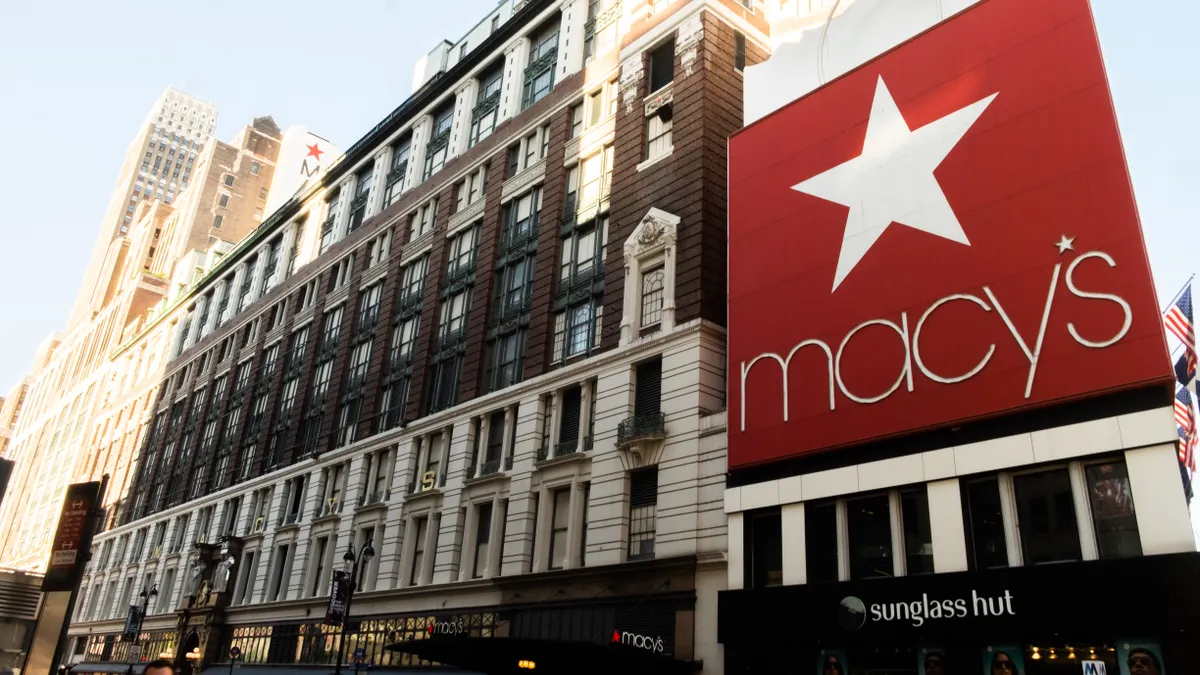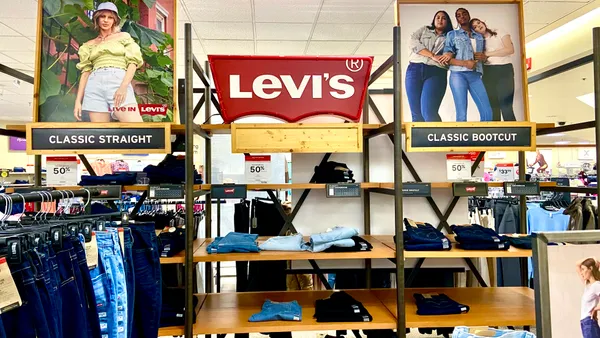Dive Brief:
-
Macy's on Thursday provided a glimpse into its first quarter results, saying that its operating loss could top a billion dollars, reaching $1.1 billion at worst or $905 million at best. The company saw operating income reach $203 million in the year-ago quarter. The department store expects net sales to have reached about $3 billion, down 44.9% year over year at best, or 45.5% at worst, according to a company press release.
-
After shuttering all Macy's, Bloomingdale's and Bluemercury stores on March 18 due to the pandemic, Macy's began reopening some on May 4. As of this week, about 190 Macy's and Bloomingdale's stores are open "in their full formats," CEO Jeff Gennette said in a statement. Another 80 Macy's stores are slated to open Memorial Day weekend, he said.
-
The company also said it has tapped Felicia Williams, who has been with Macy's since 2004 in various financial positions including her current role as senior vice president, controller and enterprise risk officer, to take on chief financial officer duties during its search to replace outgoing CFO Paula Price.
Dive Insight:
Faced with a potential billion-dollar loss for the first quarter and with e-commerce failing to make up for lost sales during the pandemic, Macy's needs stores to reopen.
And they have, slowly, with limitations and "enhanced health and safety standards across all of our stores and facilities," Gennette said. In the two weeks with some locations reopened, customer demand is "moderately higher" than the company expected, he said. But, he added, "We expect business to recover gradually."
Macy's has a well established online business, which saw a "steady uptick" in April with stores closed, helped along by omnichannel services like curbside pickup in some areas, but that "only partially offset the loss of sales from the stores," Gennette also said. Curbside pickup is on offer at some stores that remain closed, he said.
The company is in decent financial shape given the quarter's troubles, with some $1.5 billon of cash and equivalents on hand, but will end the year with about $5.7 billion in total debt, according to GlobalData Retail Managing Director Neil Saunders. But the potential size of the company's loss demonstrates "that Macy's has a very high cost base that, even with furloughs, simply drains the business when trade declines," he said in emailed comments.
Gennette said that Mother's Day went well. "Even in times of social distancing, our customers want to celebrate the special occasions in their lives, and we help them do that safely," he said.
But that carries a downside, in that Macy's is a place people turn to for outfits for events like prom and graduation that aren't taking place this year. Apparel sales are down everywhere, as stores have closed and demand has shrunk during the pandemic. "However, the impact is particularly severe for Macy's as it has a high proportion of formal, work and occasion products in clothing and demand for all these things is down severely as consumers stay home," Saunders said.
A worse problem for Macy's is its merchandising, outside of the current crisis, he also warned. "Even during normal times, Macy's struggles to maintain sales levels because much of what it sells is just not that compelling," he said, calling its apparel assortment "a jumble of bland product, sprinkled with some more interesting items" and its home collections "insipid and lack[ing] the seductive appeal of competitors like Crate & Barrel and Williams [Sonoma]."
In short, while store closures have been hurtful to Macy's, opening them may not be all that helpful. More than half of mall-based department stores could close within two years, according to commercial property research firm Green Street Advisors. Macy's has a "high exposure to malls which are one of the places consumers are most afraid to return to," Saunders said. "However, some is also down to the fact that Macy's does not have the destination status it once did and in a more cautious consumer economy it will likely be one of the big losers."















